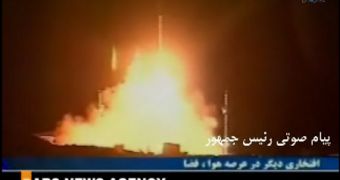According to an announcement made on Thursday, March 17, Iran recently launched a new rocket into space, carrying on top of it a space capsule. The capsule was reportedly designed to accommodate a monkey. The launch took place on Tuesday, March 15, the release further shows.
The announcement was made by the Islamic Republic News Agency, the state-run news agency in Iran. The official story is that the new capsule was launched to low-Earth orbit atop a Kavoshgar-4 rocket.
This delivery system, whose name means “Explorer” in Farsi, has lately become the centerpiece of the Iranian space program. The capsule it carried along will apparently be able to relay back images and data from orbit.
According to the IRNA, it will be placed on an orbital perch some 120 kilometers (75 miles) above the planet's surface. Though created to accommodate test animals, this particular spacecraft does not contain any living creature, the release adds.
During its last rocket launch in February 2010, the Iranians used a Kavoshgar-3 delivery system to send two turtles, a worm and a rat into space. This is tremendous progress from 2009, when all the country did was launch a Safir-2 rocket carrying a telecommunications satellite.
As for the new designs – that of the Kavoshgar-4 rocket and its accompanying capsule – they were only presented this February to the media, by the President of Iran himself, Mahmoud Ahmadinejad.
Though the nation declares that it only has peaceful intentions for its space program, many analysts in the Western world fear that the attempt at harnessing rocket technology may in fact be aimed towards the production of intercontinental ballistic missiles (ICBM).
These rockets can carry strategic nuclear payloads, and experts suspect Iran of trying to achieve this capability. But many say that the country may also be trying to build prestige and fame among both its allies and its enemies.
“They will clearly use dual-use technology for a military buildup, and as long as they at least dabble in human spaceflight, they get advantageous press coverage on that as well,” said Joan Johnson-Freese.
She holds an appointment as a professor of National Security Studies at the Naval War College, in Newport, Rhode Island. The country is most likely pursuing both scientific and military goals.
The past three successful launches demonstrate that the country is nearing its goal of harnessing rocket technology. During the early years of its space program, the Iranian government reported the loss of many delivery systems due to glitches and other issues, Space reports.

 14 DAY TRIAL //
14 DAY TRIAL //